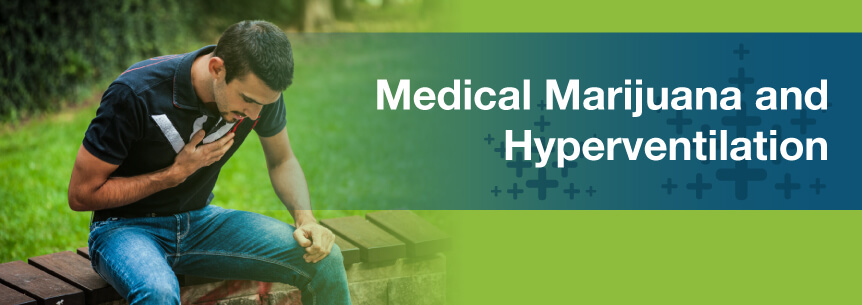
Hyperventilation may be common, but it can also be very frightening. During an acute hyperventilation episode, you begin to breathe too fast and exhale too much carbon dioxide. As your CO2 levels drop, your blood vessels narrow and you will experience lightheadedness, dizziness and chest pain.
While hyperventilation can feel overwhelming and even painful, there are treatment options — including medical marijuana for hyperventilation — to potentially help you to breathe normally and prevent hyperventilation episodes.
Cannabivarol (CBV), found in the cannabis sativa hemp plant, is a non-psychoactive cannabinoid. It’s a counterpart of cannabinol (CBN) and is also tetrahydrocannabivarin’s (THCV’s) oxidation product. THCV appears to be a possible cannabinoid treatment for:
Anxiety and stress can trigger hyperventilation. Some research on medical marijuana’s therapeutic value shows it helps with hyperventilation by treating the underlying causes of the condition — particularly anxiety.
Patients often find medical cannabis’s effect on anxiety reduction, mood enhancement and mild sedation desirable qualities especially when they’re struggling with anxiety and pain.
Find A Doctor Find A Dispensary
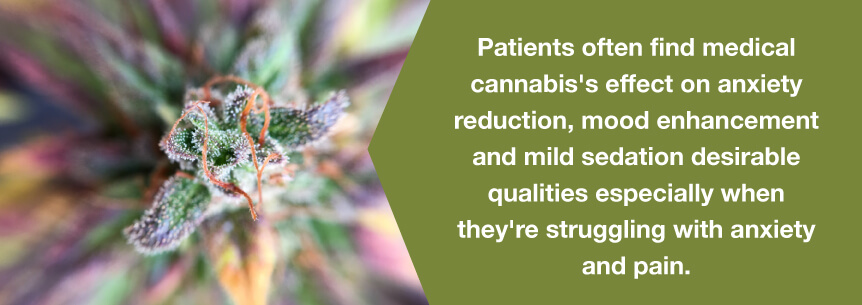
Anxiety isn’t easy to deal with. Despite how severe your anxiety is, it can make normally simple activities seem overwhelming — even impossible at times. Anxiety itself — with or without hyperventilation — can cause an array of undesirable symptoms such as:
Individuals sometimes find it challenging to obtain the proper anxiety treatment. The same treatment won’t work in the same manner for every patient, either, since we all react differently to anxiety medication and have unique brain chemistry.
Most people need to work to make a living. Or, they may be going to school, volunteering somewhere or taking care of their household. Either way, anxiety impairs their ability to perform these necessary tasks. Anxiety is real, and when it causes hyperventilation, it only makes matters worse. Medical cannabis for hyperventilation offers you hope.
Common symptoms medical marijuana and hyperventilation treatment can help with include:
Medical weed also relieves depression — another hyperventilation symptom. It clears aggression and calms mood swings and emotional upset.
Treatment for hyperventilation is typically catered to the cause. For example, a person having a panic attack will be treated for panic attacks. If hyperventilation is not deemed a medical emergency, it can be treated with breathing exercises, one of which being the stereotypical bag breathing for panic attacks.
Medical marijuana can treat the underlying cause in some cases. However, smoking anything while having breathing difficulties is not advisable. It is best to keep the lungs and breathing passages clear and unobstructed. If a doctor deems medical marijuana appropriate to treat the underlying cause, he or she will determine the best times to use the medication. It may not coincide with the hyperventilation, but rather act as a preventative. It may also be given in pill or edible form so the medication does not interfere with breathing.
Both research and anecdotal evidence show medical marijuana can both alleviate and exacerbate anxiety. The evidence available thus far suggests this has to do with individual tolerance, reaction, the dosage of marijuana and type of medical marijuana.
If a person is using medical marijuana for the first time to treat anxiety and reduce or eliminate hyperventilation attacks, he or she should be monitored by a physician to ensure the medicine is working. If it worsens anxiety, it can be very uncomfortable for the sufferer. However, it will not create a medical emergency or cause hyperventilation due to anxiety to become a medical emergency. In some cases, hyperventilation is an emergency, but panic attacks typically are not. Nonetheless, they are very uncomfortable and can even be debilitating.
Some medications — particularly aspirin and stimulants — can cause hyperventilation. While marijuana is unlikely to combat side effects of these medications or drugs while they are occurring, it can replace those drugs in people who react by hyperventilating, in some cases. The right dose of medical marijuana can certainly replace aspirin as a pain reliever in people who tolerate it.
Some studies have even shown marijuana can cause a significant reduction in cocaine intake in addicted lab animals. Therefore, drug-addicted individuals may be able to turn to medical marijuana to reduce or relieve their addiction and any hyperventilation it causes.
There is some evidence medical marijuana acts as a bronchodilator, which means it can open up the small airways and make breathing easier. In cases where hyperventilation is caused by lung disease, this may prevent attacks of hyperventilation. However, medical marijuana in its smoked form is not a safe medication for lung issues, as smoke irritates the lungs. In other forms, such as vaporized medical marijuana, it could provide a safe medication for individuals with lung diseases, such as emphysema.
Since anxiety is a major cause of hyperventilation, finding medical marijuana for hyperventilation strains starts with those to combat anxiety. However, the relationship between anxiety and marijuana is a complex one. For some patients, even a small dose provides them with relief of panic, stress, worry and other anxiety-related symptoms.
Others, unfortunately, may experience exacerbated anxiety and heightened paranoia with the herb. This reaction is common and is likely caused by the THC content in any particular strain. The good news though is you can easily find many strains that are high in cannabidiol (CBD) content and have little to no THC.
Some potentially beneficial anxiety-fighting strains to try include:
Other potent strains to calm your anxiety are:
When it comes to cannabis and hyperventilation, it’s more advisable to use the herb orally since inhaling the treatment could interfere with your breathing. If you must inhale your cannabis for hyperventilation, go with a vaporizer rather than smoking it.
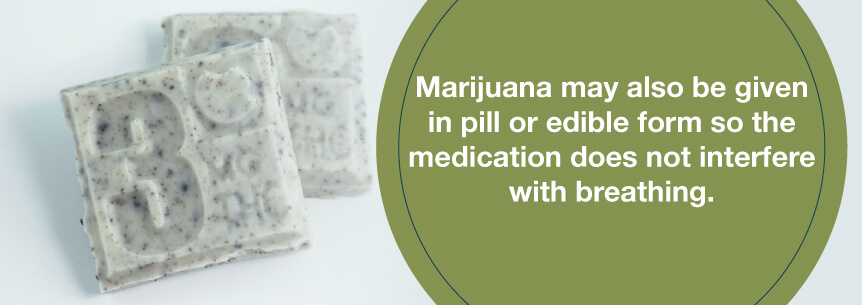
Some non-smoking marijuana and hyperventilation administration methods include:
Just remember, when taking any medicine orally — such as eating and edible or taking pills — your liver metabolizes a small fraction of the medication before it enters into your bloodstream, thereby reducing its overall bioavailability. The same is true for medical cannabis products.
If you suffer from hyperventilation, anxiety or panic attacks and are wondering if medical weed is an ideal solution for your symptoms, search our MarijuanaDoctors.com database to find a qualified cannabis doctor near you.
We also provide an abundance of resources to help educate you and allow you to make an informed decision on your specific marijuana for hyperventilation treatment plan. Browse our extensive site today to gain access to these resources, locate a medical pot dispensary and schedule your first appointment.
Find A Doctor Find A Dispensary
Hyperventilation is a frequent breathing problem in which a person breathes too fast. For some people, a severe hyperventilation episode can look like they’re panting.
Normal breathing involves a healthy exchange between breathing oxygen into your lungs and exhaling carbon dioxide out. When you hyperventilate, it causes an imbalance in the amount of oxygen you breathe in and the amount of carbon dioxide you breathe out, as you begin to exhale more than you inhale.
Sometimes called overbreathing or fast deep breathing, this imbalance causes a rapid drop in carbon dioxide in your body. As your CO2 levels drop, it narrows the blood vessels supplying blood to the brain and causes symptoms like lightheadedness.
Hyperventilation is usually an uncommon response in people that occurs due to a phobia or stress. For others, hyperventilation is a response to strong emotional states like anger or depression. In acute cases of hyperventilation, this rapid breathing occurs as a panic attack to an isolated incident.
Low CO2 levels that cause narrowing of the blood vessels to the brain are responsible for the symptoms of hyperventilation. For most people, hyperventilation episodes last for up to 30 minutes and may come with symptoms like:
You may experience some symptoms that aren’t related to hyperventilation, such as burping or bloating, headaches, vision changes and twitching.
Several factors can cause hyperventilation. In most people, it’s a response to stress, anxiety or panic and comes in the form of a panic attack. Still, some mental and physical conditions and specific situations can also lead to hyperventilation. For instance, bleeding or infection can bring on hyperventilation, as can an aspirin overdose and having a pulmonary embolism.
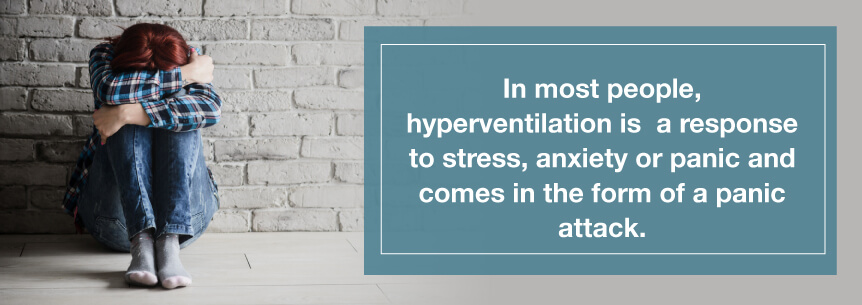
Risk factors that may make you more likely to hyperventilate include cardiac disorders, asthma, COPD and other lung disorders and panic disorders.
The following are some of the most common causes of rapid breathing:
Other factors contributing to hyperventilation include:
Two primary forms of hyperventilation exist. These are:
While hyperventilation isn’t usually dangerous, episodes of hyperventilation can be very frightening. When you hyperventilate, it can feel like something is very wrong, and this anxiety can worsen your symptoms.
The symptoms of hyperventilation also interfere with your life and make it difficult to maintain relationships and work. The physical symptoms of hyperventilation also cause significant discomfort and fear.
A few collected statistic about hyperventilation include:
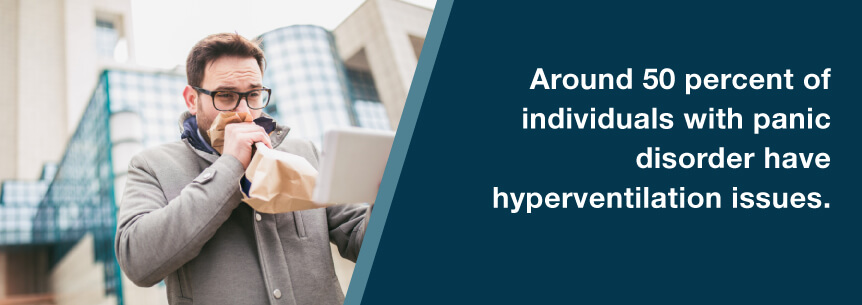
Behavioral or cognitive therapy is the standard treatment for hyperventilation, which helps coach you through episodes to remain calm and increase your carbon dioxide levels. When you experience an acute episode of hyperventilation, it can increase your anxiety and worsen your symptoms by causing you to automatically breathe even faster and focus too much on your breathing. Your doctor can walk you through breathing and relaxation techniques that may help you prevent an attack from occurring.
Your doctor may prescribe medication if your symptoms or the frequency of your hyperventilation are severe. Anti-anxiety medications are usually prescribed for hyperventilation because it’s often triggered by stress and anxiety.
If your hyperventilation is due to anxiety, stress or panic attacks, self-remedies you can try include yoga, meditation and exercise. You can also practice breathing exercises where you breathe from your abdomen and diaphragm as opposed to your chest wall.
If you’re having a fast-breathing episode for the first time, it’s crucial to seek medical attention to rule out a serious cause.
One of the most innovative developments in the treatment of hyperventilation is the development of a new breathing therapy. This treatment can help people with panic disorder or other breathing problems normalize their breathing to reduce hyperventilation faster than the standard cognitive therapy. The treatment, called CART therapy, helps you learn to breathe in a way to reverse hyperventilation.
Unlike standard treatment, which has a goal of reducing panic and anxiety to relieve physical symptoms, the breathing technique raises CO2 levels to stop the physical symptoms.